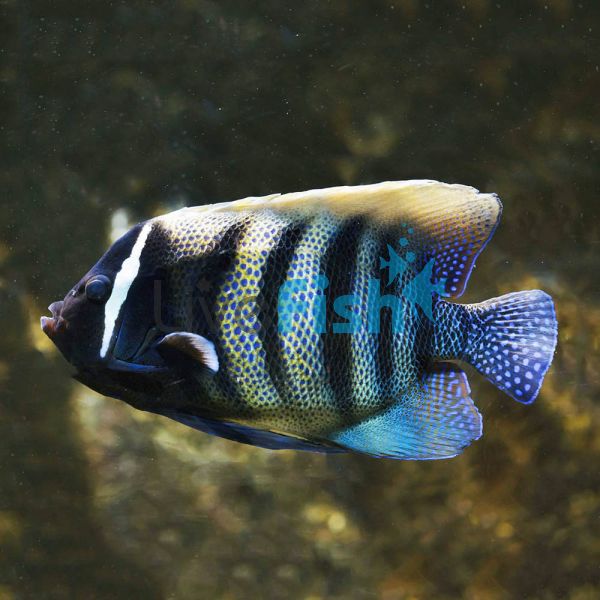Six Banded Angelfish - Medium Juvenile
Six Banded Angelfish - Pomacanthus Sexstriatus
Medium size fish with Juvenile colouration
The Six Banded Angelfish is a semi-aggressive species which may not integrate well with other Angelfish.
This species’ body colour changes as it matures. Juveniles’ black stripes dominate the body, making it look more like they have a black body with thin pale stripes which shift to a blue colour over the fins. However, as they mature, the black stripes become more subtle, fading and thinning, to resemble zebra stripes over a pale, yellow spotted body. The adults’ fins are a similar pale colour with the rear of the tail fin becoming a darker shade with blue spots.
Six Banded Angelfish are difficult to breed, there is no difference in colouration between male and females. They are hermaphroditic, and the female can switch sexes if a male is required in a group.
This species is often spotted in pairs because when they mate, they stay with that partner for life.
Six Banded Angelfish are distributed across the Indo-Pacific region.
Their natural habitat is around coral reefs, juveniles are more prevalent around shallow areas of reef whereas adults occupy part of the reef which have an abundance of coral. The maximum length of the Six Banded Angelfish can reach is around 11.8 inches (30 centimetres).
These are popular fish amongst aquarists but they are not easy to look after and need some experience in keeping fish.
Tank Recommendations for Six Banded Angelfish
The 6 Banded Angelfish is a popular, attractive choice for aquarists, but attention needs to be given to tank size and water quality.
At least a 220 gallons (833 litres) tank is recommended.
Six Banded Angelfish are better suited to Fish Only With Live Rock (FOWLR) aquariums. They require plenty of hiding places amongst rocks and crevices and open space for swimming. It is best to introduce them to well-established aquariums, as the last Angelfish in the tank, with high-quality water.
If Six Banded Angelfish are introduced to a reef aquarium they will nibble on certain hard and soft corals, so monitoring is essential.
Suitable Tank Buddies
6 Band Angelfish are semi-aggressive, they generally do not get on with their own species or similar varieties of fish.
It is possible for them to co-habit as a pair, but they need to be introduced simultaneously and the tank needs to be large enough to accommodate both fish.
Usually Compatible
6 Banded Angelfish can be housed in an established tank with Anthias, Boxfish, Clownfish, Hogfish, Pufferfish and Squirrelfish.
Sometime Compatible
Caution is advised with Cardinalfish, Dartfish, Filefish, Jawfish, Sharks/Rays and Triggerfish
Rarely Compatible
Unless they are paired with a mate, Six Banded Angelfish will show aggression if they co-habit with the same species or species with a similar size and colouration.
Avoid most soft Corals and LPS. Seahorses/Pipefish are also too delicate to be housed in the same tank.
Feeding Your Six Banded Angelfish
Six Banded Angelfish are omnivores. In the wild, they will eat algae, coral, small invertebrates, and other fishes’ eggs. In captivity, they need a mixed diet. This consists of frozen foods such as mysis shrimp and fortified brine shrimp, as well as prepared food containing sponge. Vegetables such as broccoli and macroalgae are suitable as well as flake food containing nori and spirulina. These fish need feeding several times per day.
| Scientific Name | Pomacanthus Sexstriatus |
|---|---|
| Common Names | Six Banded Angelfish, Six Bar Angelfish or Six Striped Angelfish |
| Diet | Omnivore |
| Fish Family | Pomacanthidae |
| Lifespan (years) | 10 |
| Max. Length (cm) | 30 |
| Min. Tank Volume (l) | 833 |
| Origin | Indo-Pacific region, including Malaysia, Indonesia and further South East to Australia Sociability: Semi-Aggressive |
| Reef Safe | No |
| Sociability | Semi-aggressive |
| Water Conditions | 22-25° C, dKH 8-12, pH 8.1-8.4, sg 1.023-1.025 |




